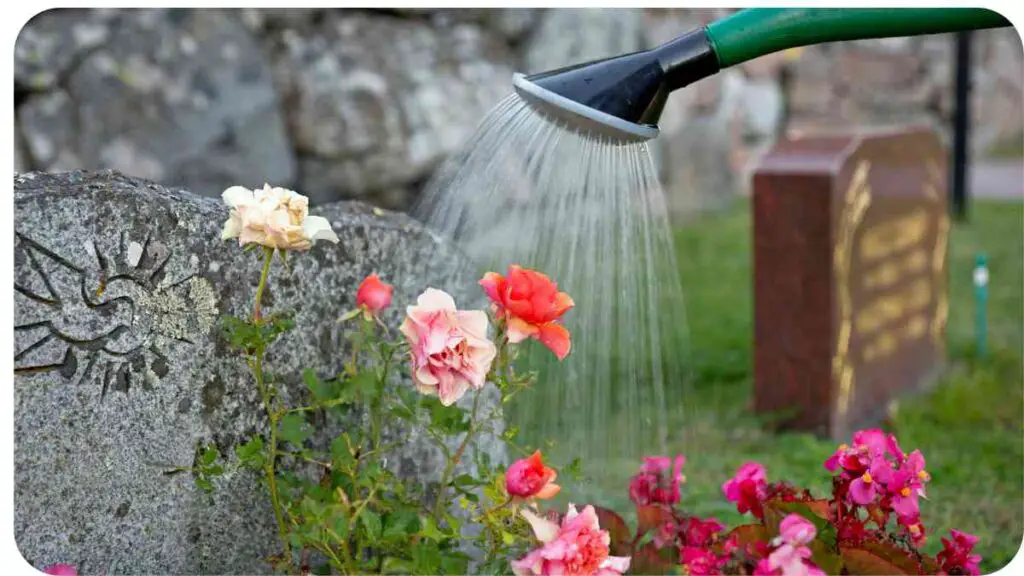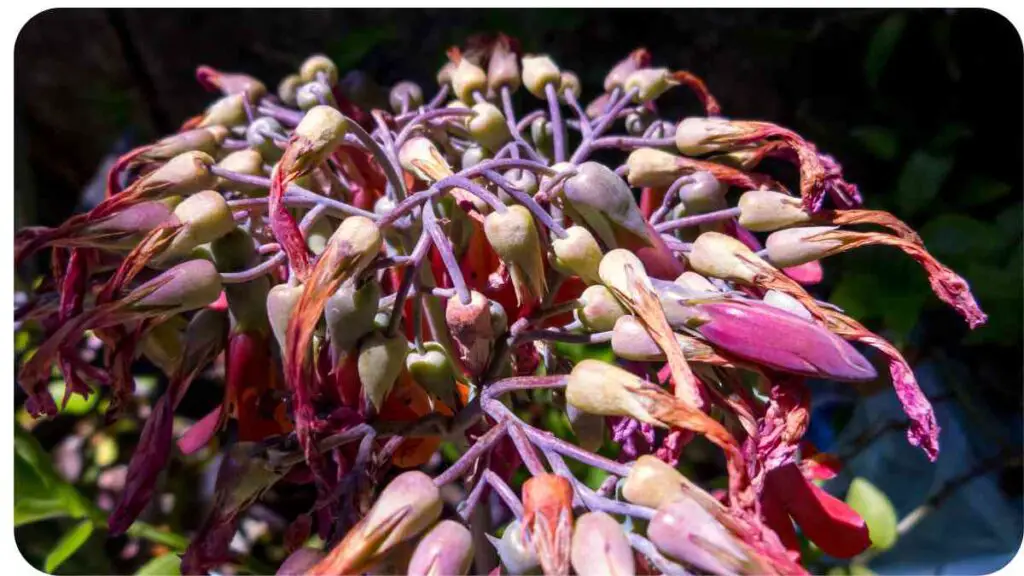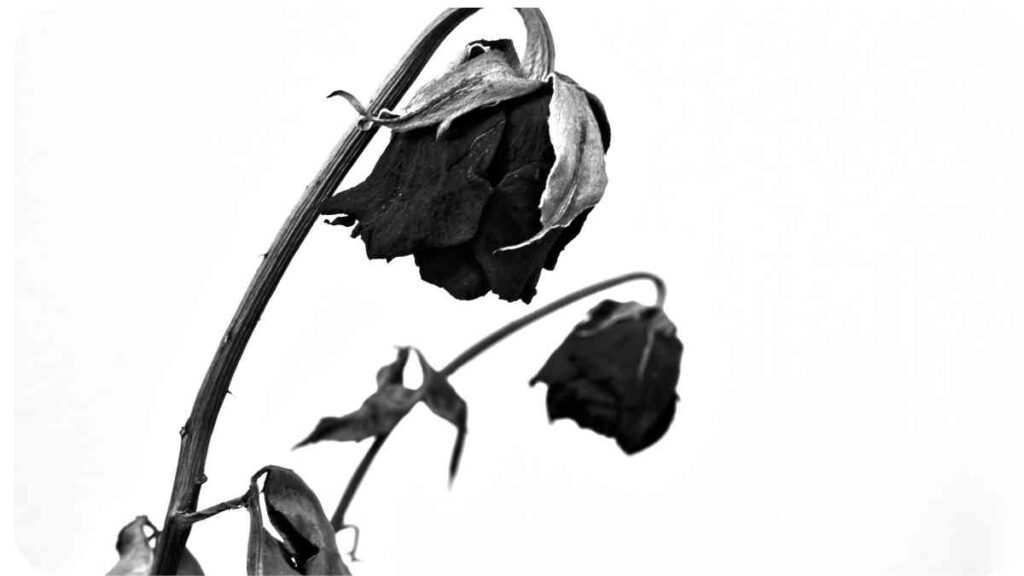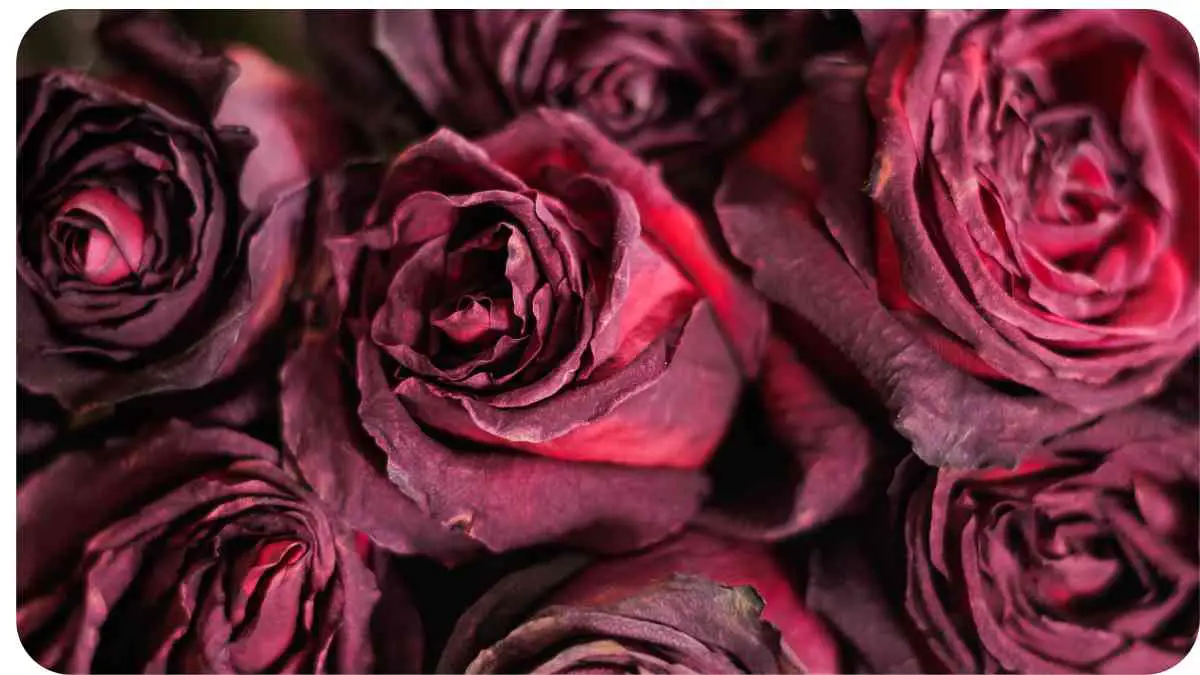Flowers, with their fleeting beauty, add charm to our spaces, yet the inevitable question lingers can dead flowers pose risks to our health? This guide is a bouquet of insights, unraveling the mysteries of wilting blooms. Join us as we explore the health implications of dead flowers and unveil expert advice on recognizing, reviving, and responsibly disposing of them.
From allergies to cultural perspectives and eco-friendly alternatives, this article blossoms into a comprehensive resource for flower enthusiasts. Let’s navigate the delicate world of fading petals, ensuring our love for flowers doesn’t compromise our well-being
| Takeaways |
|---|
| Dead flowers can have negative effects on both physical and emotional well-being. |
| Dead flowers should be disposed of properly to prevent the release of mold spores and bacteria. |
| Different cultures have varying beliefs and traditions around dead flowers. |
| Feng shui principles suggest that dead flowers can block the flow of positive energy in a space. |
| Dried flowers can be a good alternative to fresh flowers and can be a long-lasting addition to your home decor. |
Are Dead Flowers Bad For Your Health?
Do you suspect that your dead flowers might be affecting your health? Allergies are a common concern, with dead flowers potentially triggering hay fever, asthma, skin rashes, and even severe reactions like anaphylactic shock. Symptoms can vary from immediate to delayed onset after exposure to allergens.
While some allergies are mild, others can pose significant risks to respiratory health and overall well-being. Understanding how dead flowers impact your health is crucial for mitigating potential risks and maintaining a healthy environment.
In this article, we explore the connection between dead flowers and health, shedding light on the various ways they can affect you. Let’s delve deeper into the topic to help you make informed decisions about handling and disposing of dead flowers.
“Introducing fake flowers into your home can impact the energy of a space. Our guide to fake flowers and feng shui can help you create a more harmonious environment.”
Can Dead Flowers Be Lethal?

It’s a common belief that dead flowers can be lethal, but let’s set the record straight – dead flowers cannot kill you. However, they can pose health risks, making you unwell and triggering allergies, bad breath, and other related problems.
For individuals with allergies, the pollen from dead flowers might worsen their symptoms. Additionally, the use of pesticides on flowers before they wither can introduce chemicals that may come into contact with your skin during handling or be inhaled as dust when removing them from their vase.
In this segment, we debunk the notion of dead flowers as a lethal threat while highlighting the importance of understanding the potential health issues they may cause. Let’s explore how to navigate these risks and enjoy flowers responsibly.
Do Dead Flowers Pose Health Risks?
The likelihood of dead flowers making you sick is generally low for most individuals. However, understanding their potential effects on health is essential.
The primary health concern associated with dead flowers is allergies. Inhaling pollen from withering flowers can trigger allergic reactions, leading to asthma, hay fever, and respiratory issues.
Dead flowers may also induce skin irritations and headaches. Contact with the petals can cause itching or burning sensations due to the plant’s sap containing chemicals akin to those found in poison ivy or poison oak.
Moreover, individuals sensitive to fragrances may experience olfactory fatigue when exposed to the scent of dried-out blooms, resulting in feelings of dizziness or nausea.
While the overall risk is modest, it’s crucial to be aware of potential health implications and take appropriate precautions when handling or disposing of dead flowers. Stay informed to ensure a safe and enjoyable floral experience.
“Have you ever wondered if dried flowers can bring bad luck? Our article on dried flowers and superstitions explores the cultural beliefs surrounding dried flowers.”
Identifying Dead Flowers: Signs and Solutions

Determining whether your flowers are dead is essential for maintaining a vibrant display. Here are some key indicators:
- Loss of Color and Wilted Appearance: Dead flowers typically lose their vibrant color and begin to wilt. If your fresh-cut flowers appear dull and lackluster, they may be nearing the end of their lifespan.
- Limpness and Greenish Tinge: Flowers that appear limp and have a greenish tinge are likely in the process of dying or already dead. Pay attention to the overall vitality of the stems and petals to assess their condition accurately.
- Brown and Dry Stems: Examine the stems of your flowers for signs of decay. If the stems appear brown and dry rather than green and supple, it may indicate that the flowers have reached the end of their life cycle.
Avoid premature disposal by taking proactive steps to prolong the lifespan of your flowers:
- Optimal Lighting: Place your flowers in bright light, but ensure they are shielded from direct sunlight to prevent wilting and burning.
Reviving Dying Flowers: Tips for Prolonged Bloom
Witnessing your flowers wilting doesn’t mean it’s the end. Try these techniques to breathe new life into your wilting blooms:
- Trimming Stems: Cutting the stems at an angle can enhance water absorption, extending the life of your flowers. Remove any discolored or decaying parts to promote vitality.
- Vase Revival: Placing flowers in a vase of fresh water can rehydrate them. Change the water every few days to prevent bacterial growth and ensure a clean environment for your blooms.
- Cool, Dark Storage: Storing flowers in a cool, dark place, like a cupboard or closet, can slow down the aging process. This protects them from excessive heat and sunlight, preserving their freshness.
- Refrigeration: If available, refrigeration is an option, but caution is key. Avoid overdoing it, as extreme cold can damage delicate flowers. For best results, seal them in an airtight plastic bag with a bit of water, and defrost when ready for use.
- Outdoor Preservation: On cooler days, placing your flowers outside can help maintain freshness. Be mindful of weather fluctuations to prevent damage from heat or humidity.
“Did you know that certain flowers are not only beautiful but also edible? Our guide to edible flowers and their health benefits can help you incorporate more nutritious and flavorful options into your diet.”
Pro Tips for Prolonging the Life of Your Living Flowers
Ensuring the longevity of your living flowers requires thoughtful care. Here are some expert tips to keep your blooms vibrant for an extended period:
- Heat Management: Protect your flowers from heat sources, as excessive warmth can lead to faster wilting and unpleasant odors as they fade.
- Avoid Refrigeration: While refrigeration can be beneficial for some cut flowers, living flowers are best kept away from the fridge. The extreme cold can be just as detrimental as heat, risking the health of your blooms.
- Ample Space: Give your living flowers plenty of room to thrive. Overcrowding in a single vase limits water availability, leading to premature wilting. Ensure each stem has sufficient space to absorb water and nutrients.
- Mindful Arrangement: Be cautious with the arrangement of your flowers. A bunch of stems in a single vase may lead to uneven water distribution, causing some stems to rot while others dry out. Optimal spacing and a balanced arrangement are key.
- Right Vase Size: Choose an appropriately sized vase to prevent water pooling and root submersion. Too small a vase can lead to stagnant water, fostering mold and root issues.
Breathing in Pollen of Dead Flowers
Contrary to common perception, breathing in the pollen of dead flowers is not harmful. In fact, it may offer unexpected benefits, especially for those battling seasonal allergies.
If you’ve been experiencing allergy symptoms, consider bringing home some dead flowers. Surprisingly, they can help alleviate allergies by capturing pollen that would otherwise be dispersed in your outdoor spaces.
Understanding the role of pollen sheds light on this phenomenon. Pollen, the male part of a flower, carries genetic material crucial for plant reproduction. It aids in the transfer of genetic information from one plant to another, facilitated by wind currents or insect pollinators like bees and ants.
The purpose of pollen extends beyond plant reproduction; it serves as a vital food source for insects. Beyond honey, insects require nutrients found in pollen to not just survive but thrive. The intricate relationship between plants and pollinators ensures the continued growth and diversity of flora on our planet.
While the idea of bringing dead flowers home for allergy relief may seem counterintuitive, it underscores the intricate ecological balance between plants and pollinators. Embracing this natural process might offer unexpected benefits for both our floral displays and the broader ecosystem.
“While flowers can be a beautiful addition to your home, it’s important to be aware of potential hazards for pets. Our guide to flower bulbs and their toxicity to dogs can help you keep your furry friends safe and healthy.”
Handling Dead Flowers
Contrary to conventional wisdom, washing your hands immediately after touching dead flowers might not be the best approach. The reason lies in the potential airborne dispersal of pollen, and here’s why you might want to reconsider your handwashing habits.
Pollen from dead flowers has the ability to become airborne and travel considerable distances. Bees, known to traverse large areas in search of food sources, play a role in this dispersion. Washing your hands promptly after handling dead flowers could inadvertently spread more pollen than necessary.
Instead, consider a more measured approach:
- Observation First: Touch dead flowers lightly while closely observing them. Appreciate their appearance and take a moment to connect with their beauty.
- Step Back: After your observation, take a step back. Allowing a brief interval before any further action minimizes the immediate spread of pollen.
- Gentle Brushing: If needed, gently brush off any debris or dust from the flowers. This step can help mitigate the potential release of pollen into the air.
Dead Flowers and Allergies
Allergies, stemming from immune system reactions to specific airborne proteins, can manifest in various ways, ranging from mild to severe. Dead flowers, specifically their pollen, can be a trigger for allergic reactions, although the severity is often dependent on individual sensitivities.
For those with pollen allergies, even from dead flowers, symptoms may include itchy eyes and sneezing. While these allergies are generally not considered dangerous, they can cause discomfort and inconvenience, particularly for individuals unaccustomed to such reactions.
It’s crucial to recognize the potential for allergic responses to dead flowers and take appropriate measures to minimize discomfort. Understanding individual sensitivities and adopting preventive strategies can help individuals enjoy the beauty of flowers without compromising their well-being. If you have known allergies, consider taking precautions when handling or being in proximity to dead flowers to mitigate potential allergic reactions.
“If you’re looking to make your outdoor space more inviting, consider adding a gazebo. Our expert tips on making a gazebo taller can help you create a cozy and functional area for entertaining or relaxing.”
Mindful Disposal of Dead Flowers

When it comes to disposing of dead flowers, there are eco-friendly alternatives to consider. Here are some thoughtful ways to give your blooms a second life:
- Composting: Transform your dead flowers into nutrient-rich compost by layering flower heads and leaves on an existing pile of organic material, such as grass clippings and vegetable scraps. Maintain a balance and turn the compost regularly for optimal decomposition.
- Recycling: Explore local recycling options that accept organic waste. Some communities offer green waste recycling programs where dead flowers can contribute to the creation of compost or mulch.
- Community Compost Bin: If space is limited in your yard, check if there’s a community compost bin available. Many neighborhoods or cities have communal composting facilities where residents can collectively contribute organic waste.
- Garden Enhancement: Improve your garden’s soil quality by incorporating dead flowers into the soil. This is particularly beneficial in areas where grass struggles due to poor soil conditions. The decomposing organic matter will enrich the soil and promote healthy plant growth.
Giving New Life to Dead Flowers
The prospect of discarding dead flowers can be disheartening, but there are eco-friendly alternatives that breathe new life into these once vibrant blooms. Consider these sustainable options to repurpose your old cuttings:
- Natural Decomposition in the Garden: A simple and natural approach involves tossing your dead flowers into the garden. Here, they will decompose over time, contributing valuable organic matter to the soil. Be prepared for the possibility of attracting insects and pests interested in the decomposing material.
- Controlled Composting: For those seeking a more controlled solution, composting is an excellent choice. Mix dead flowers with organic materials like leaves and yard dirt, avoiding the inclusion of meat scraps. Through bacterial action, known as “rotting,” this process transforms waste into nutrient-rich soil for future gardening endeavors.
- Creative Reuse: Explore imaginative ways to reuse dead flowers in artistic projects or home decor. Pressing flowers, crafting potpourri, or creating floral arrangements with dried blooms are all creative alternatives that extend the life of your flowers in a different form.
Eating Dead Flowers
Consuming a dead flower, while not inherently allergenic, poses potential risks, and caution is advised. Here’s why you might want to think twice before indulging:
- Pesticide Concerns: Dead flowers, during their growth or post-mortem stage, may have been treated with pesticides or other chemicals. Ingesting these substances can lead to adverse reactions, especially for individuals prone to allergies. The lack of allergens in the flower itself doesn’t eliminate the potential presence of harmful chemicals.
- Unknown Chemicals: If you’re unaware of the specific chemicals used in the cultivation or preservation of the dead flower, it’s safer to err on the side of caution. Allergic reactions to unidentified substances can range from mild discomfort to more severe symptoms.
- Avoiding Allergy Triggers: Individuals with known allergies should exercise prudence when it comes to consuming flowers, even in their wilted state. Without a clear understanding of the flower’s chemical history, it’s advisable to refrain from eating them to prevent potential allergic reactions.
Conclusion
In conclusion, the journey of dead flowers extends beyond their wilting petals. Understanding their potential impact on health and environment allows us to navigate their lifecycle with mindfulness and responsibility.
From allergies triggered by pollen to the dangers of ingesting treated flowers, awareness is key in handling dead blooms. Embracing eco-friendly disposal methods such as composting and recycling not only reduces waste but also enriches our soil and nurtures our gardens.
Moreover, the care we extend to living flowers ensures their vitality and longevity. Proper hydration, suitable environments, and preventive measures safeguard their beauty and contribute to a flourishing floral landscape.
As stewards of nature’s bounty, let us approach the life and afterlife of flowers with reverence and intentionality, fostering a harmonious relationship between beauty, health, and sustainability. Through mindful practices and informed choices, we honor the delicate balance of the natural world and cherish the timeless allure of flowers in all their forms.
Further Reading
Here are some additional resources to learn more about the topic of dead flowers and their impact on your home and well-being:
Elle Decor – This article discusses the symbolism of dead flowers in different cultures and provides tips on how to repurpose them in a creative way.
House Beautiful – This article explores the impact of dead flowers on feng shui and provides advice on how to properly dispose of them.
IndiaTV News – This article discusses the Vastu principles related to dead flowers and why it’s important to avoid keeping them in your home.
FAQs
What are the health risks associated with dead flowers in the home?
Dead flowers can release mold spores and bacteria that can cause respiratory problems and allergies. In some cases, they can also attract pests such as gnats and fruit flies.
How can I dispose of dead flowers properly?
It’s best to dispose of dead flowers in a sealed plastic bag to prevent the release of mold spores and bacteria. You can also compost them if they are not too diseased or moldy.
Can dead flowers impact the energy of a space?
Yes, dead flowers can have a negative impact on the energy of a space according to feng shui principles. It is believed that they can create stagnant energy and block the flow of positive chi.
Are there any cultures where dead flowers are considered good luck?
While many cultures view dead flowers as a symbol of death and decay, in some cultures such as Mexico’s Day of the Dead celebrations, they are seen as a symbol of life and rebirth.
Can I keep dried flowers in my home without any negative effects?
Yes, dried flowers can be a beautiful and long-lasting addition to your home. However, it’s important to keep them dust-free and avoid using any chemicals or sprays on them.

I am Hellen James, a landscape architect. For many years I have written about landscaping for various publications; however, recently decided to focus my writing on personal experience as a profession.

